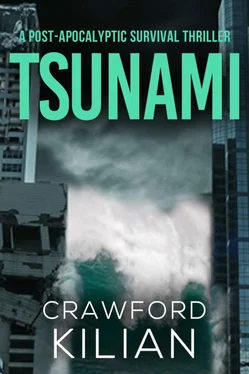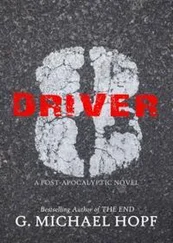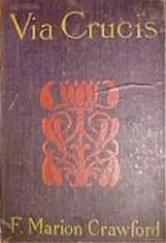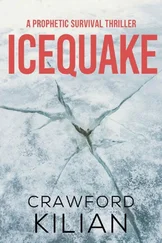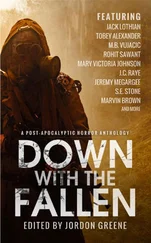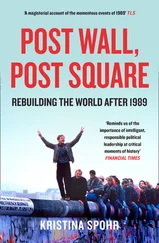“Why so many guns?” Owen asked. Mitchell shrugged.
“Just makin’ sure everything goes where it’s s’posed to. We got some mean mothers in the neighbourhood, you know?”
Don and Owen, with their escort behind them, started up a long flight of concrete stairs. It was slow going up the hill: dozens of people were moving up and down the stairs. All were black; some gave Don and Owen curious glances.
“Here come supper!” a teenager yelped as he passed them.
“Get away with you!” Mitchell laughed. Hilarity rippled up and down the stairs. Don grinned; Owen did not.
Tents and lean-tos crowded together on the playgrounds and dead lawns of the housing project, and plastic sheets and tarpaulins were strung everywhere. But not many people were in sight.
“Where is everybody?” Don asked Mitchell as they walked down a muddy lane between tents and camper trucks.
“Kids are in the gym at the school. Old folks are lookin’ after the babies. Sick and hurt folks, they’re in the apartments. Everybody else is workin’ indoors or down the hill.”
“You people really landed on your feet,” Owen said. Mitchell grinned, not very pleasantly.
“Well, you know, this new president, he talks about ‘dynamic self-reliance.’” He mimicked an educated white accent: “‘We don’t want black people to grow up in a welfare-oriented culture, we want them to be proud and self-supporting.’ What that means is, they got tired of paying to help folks. So we been lookin’ after ourselves, just like the man says.”
“What can you tell us about Mrs. Debney?” Don asked.
Mitchell chuckled. “You call her ma’am .”
They reached the community centre, a low, rambling stucco building. Inside, the noise and smell were overpowering: bawling children, blaring cassette players, dozens of high-pitched conversations, the ammoniac stink of wet diapers. The rooms and offices were dim, lit only by daylight falling through the windows. Mattresses and sleeping bags carpeted the floors, and children bounced happily over sleeping babies.
Mitchell led them to a big kitchen at the rear of the building. More than a dozen women were working there. Kettles of soup simmered on two big gas ranges; the soup’s aroma mingled with that of baking bread. Dirty dishes clattered in sinks, and everyone seemed to be working hard and having a good time.
A tall woman was kneading bread dough on a counter-top. She might have been thirty, or fifty: robust, broad-shouldered and handsome. Under her apron she wore jeans and a white jersey that set off the darkness of her skin.
“Mrs. Debney? These gentlemen, they’re from the ship.”
“How do you do?” Mrs. Debney kept kneading as Don and Owen introduced themselves.
“We understand you need food and medical supplies,” Owen said, raising his voice over the commotion.
“We’re down to twenty pounds of flour, Mr. Ussery.” Her voice was deep and powerful. “I sent some of my boys off to find more, but they haven’t come back yet. Yes, and medical supplies. We got lots of people hurt, lots of burns, broken bones.”
“What about the government — the Red Cross, the National Guard? Civil Defence? The Navy?” Owen gestured in the direction of the shipyards.
Mrs. Debney put the dough into a buttered steel bowl, and began mixing a fresh batch. “Nobody’s helping. Navy moved their people out in helicopters yesterday. We haven’t heard a peep from City Hall, or the state government, or anybody else.”
“That’s incredible,” Owen muttered. “They must be stretched damn thin.”
“I don’t know and I don’t care,” said Mrs. Debney. “All I know is, I got over two thousand people lost their homes, and hundreds hurt, and more coming in every minute. The whole Bayview neighbourhood is burning down. I need help, Mr. Ussery.”
“But — we’ve only got maybe twenty days’ food for thirty-two people, and some medical supplies, just a little—”
“We’ll take it all, and thank you. That’s six hundred and forty servings, more if we stretch it. And the medical things — bandages, drugs, whatever you got. Anybody a doctor?”
“Yes, and four or five first-aid people. Uh, Mrs. Debney, look — we have to eat too. I don’t know how long we’ll have to stay aboard our ship.”
“You’re all welcome to come here. Take potluck, and give us a hand. Especially that doctor and those first-aid people.”
“I can’t order my people to do that,” Owen said. “They want to get home and see their families.”
“I understand. Just so long as we get some food and medical help, your people can come and go as they please.”
Owen’s mouth compressed into a tight line. Don said, “Excuse us, Mrs. Debney,” and led him a few steps away.
“Let her have the food. They obviously need it. We’ll use the Zodiacs to get our people ashore. Mrs. Debney’s people can give us some local support in exchange.”
Owen looked around the dim, noisy kitchen, and nodded reluctantly.
“Okay,” he told Mrs. Debney. “We’ll supply our food and medicine, and our doctor. In exchange we’d like some help with shelter for crew members who can’t get home yet.”
Mrs. Debney turned the bread dough out onto the counter and started kneading again. “All right. Thank you, Mr. Ussery. Mitchell, you see to it.”
“Yes, ma’am. Get right on it.”
She smiled. “Well, I won’t keep you.”
Mitchell, Owen and Don headed back to the stairs.
“I see why you call her ma’am,” Don said.
“She’s a pretty smart ole lady,” Mitchell nodded. “It don’t pay to mess with her.”
* * *
Don rode in one of the Zodiacs north along the shattered waterfront. The wind was still blowing from the west, but blue sky showed through gaps in the clouds; the passengers squatted in the middle of the big inflatable boat, trying to shield themselves from the UV. A black from Hunter’s Point sat easily in the stern, guiding the Zodiac with no more protection than a pair of sunglasses and a poncho.
“This is like old times,” the man remarked to Don. “I used to run one of these when I was in the navy.” He put out a calloused hand. “I’m Chief.”
“Don Kennard. Good to meet you.”
“Where you headed for?”
“Berkeley.”
“Woo. Good luck. Think you can get across the Bay Bridge all right?”
“I hope so.”
Don was looking east, trying to judge what the far end of the bridge was like, when a sudden concussion made him turn to the west.
They were less than a kilometre offshore, just east of Potrero Hill. The blocks of houses at the foot of the hill were in flames, and the freeway that sealed the hill off from the waterfront was blackened by smoke. Up on the hill, two clouds of debris were gently settling; as he watched, Don saw another cloud shoot up suddenly. Moments later, the crash of the explosion reached them.
“They’re dynamiting the houses,” Don said. “Just blowing ‘em up, all along the line of that street.”
“What for?” asked Chief. “Trying to stop the fires?”
“I think so. Just like the earthquake and fire in nineteen-oh-six. At least it shows that someone’s trying to do something. The government hasn’t just disappeared, the way it has in Hunter’s Point.”
“If that’s their idea of doin’ something,” said Chief, “I’d just as soon they forget about us.”
The smoke thickened as the Zodiac travelled north across the muddy bay where PIO had stood. Chief manoeuvred cautiously, almost daintily, through a maze of logs, boards, capsized boats, even furniture. The bodies in the water were past counting. Don saw the other passengers’ face grow drawn and impassive and knew that his own must look the same. He coughed in the bitter smoke.
Читать дальше
